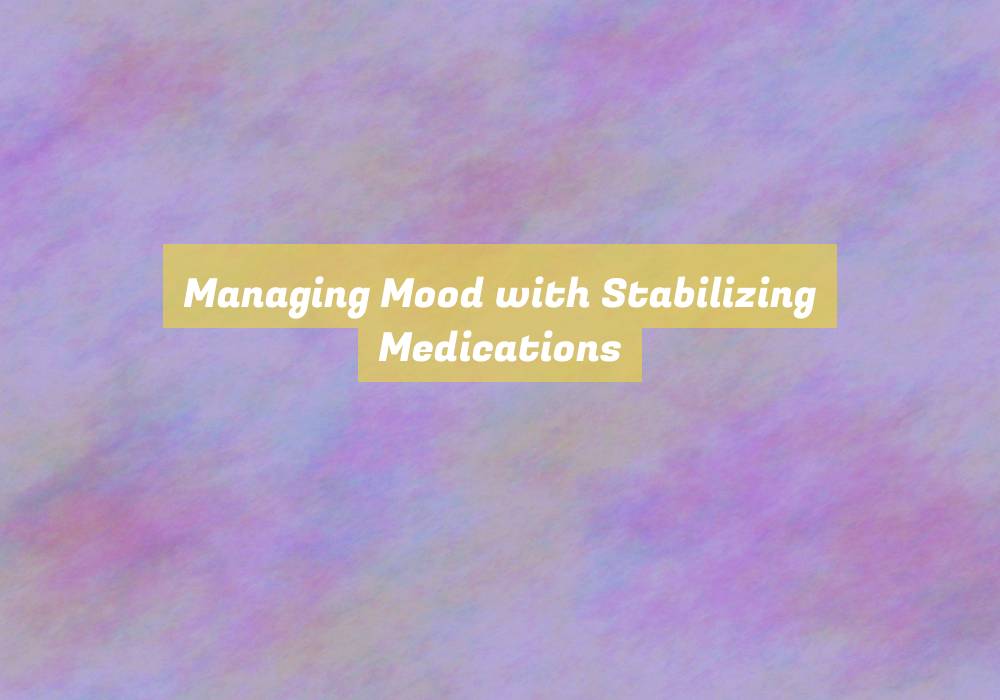Managing Mood with Stabilizing Medications
So, youG??ve probably heard about the rollercoaster ride that is managing mood swings without stabilizing medications. It can feel like youG??re constantly teetering on the edge, never quite sure when the next mood shift will hit.
But fear not, because there are effective ways to manage your mood with stabilizing medications. In this discussion, weG??ll explore the different types of stabilizing medications, the benefits and risks they entail, how to incorporate them into your treatment plan, and strategies for managing potential side effects while monitoring their effectiveness.
If youG??re tired of feeling like your moods are running the show, stick around to discover how stabilizing medications could offer you the stability youG??ve been seeking.
Types of Stabilizing Medications
When managing mood disorders, various types of stabilizing medications can be used to help regulate and balance mood swings. One common type is mood stabilizers, which are often prescribed to manage bipolar disorder. These medications work by stabilizing the drastic shifts in mood that individuals with bipolar disorder experience.
Another type of stabilizing medication is antipsychotics, which can also be used to stabilize mood in addition to their primary function of managing psychotic symptoms.
Antidepressants are commonly used to stabilize mood in individuals with depression or anxiety disorders. These medications help regulate the levels of neurotransmitters in the brain, which can have a direct impact on mood.
Additionally, anti-anxiety medications like benzodiazepines or buspirone can help stabilize mood by reducing feelings of anxiety and promoting a sense of calm.
ItG??s important to work closely with a healthcare provider to determine the most suitable stabilizing medication based on individual symptoms and medical history. Regular monitoring and open communication with your healthcare provider are essential for effective management of mood disorders with stabilizing medications.
Benefits and Risks of Mood Stabilizers
Mood stabilizers offer both benefits and risks in managing mood disorders, requiring careful consideration and monitoring by your healthcare provider.
The benefits of mood stabilizers include their ability to help regulate mood swings, reduce the frequency and severity of manic and depressive episodes, and improve overall quality of life. They can also aid in preventing the extreme highs and lows associated with bipolar disorder and other mood disorders. Additionally, some mood stabilizers have been found to have a positive impact on impulse control and irritability.
However, itG??s important to note the potential risks associated with mood stabilizers. These medications may have side effects such as weight gain, dizziness, drowsiness, and tremors. In some cases, they can also affect thyroid and kidney function. Moreover, thereG??s a risk of toxicity if the medication levels become too high in the body.
ItG??s crucial to work closely with your healthcare provider to monitor for any adverse effects and make adjustments to the treatment plan as needed. Finding the right balance between the benefits and risks of mood stabilizers is essential in effectively managing mood disorders.
Incorporating Medications Into Treatment Plans
How can medications be effectively integrated into your treatment plan for managing mood disorders?
When incorporating medications into your treatment plan, itG??s crucial to work closely with your healthcare provider to develop a comprehensive approach. First, your provider will conduct a thorough assessment to determine the most suitable medication based on your symptoms, medical history, and individual needs. TheyG??ll then collaborate with you to establish clear treatment goals and regularly monitor your progress.
ItG??s essential to adhere to the prescribed medication regimen and communicate openly with your healthcare provider about any side effects or concerns. Additionally, integrating medications into your treatment plan may involve making lifestyle adjustments, such as improving sleep habits, engaging in regular physical activity, and adopting healthy eating patterns. These lifestyle modifications can complement the effects of medications and contribute to overall mood stability.
Moreover, psychotherapy or counseling may be recommended in conjunction with medication to address underlying emotional challenges and enhance coping strategies. By actively participating in your treatment plan, staying informed about your medications, and maintaining open communication with your healthcare provider, you can optimize the effectiveness of medication integration for managing mood disorders.
Managing Side Effects and Monitoring Effectiveness
Are you experiencing any side effects from your medication? If so, itG??s crucial to communicate this to your healthcare provider. They can work with you to adjust the dosage or explore alternative medications to minimize these effects. Managing side effects and monitoring the effectiveness of mood-stabilizing medications are essential for your overall well-being.
Tracking your mood and any related symptoms is vital for monitoring the effectiveness of your medication. Keep a mood journal to record your daily experiences, mood fluctuations, and any side effects. This can provide valuable insights into how well the medication is working for you.
Regularly discussing this information with your healthcare provider will enable them to make informed decisions about your treatment plan. Finding the right balance of managing side effects and ensuring the effectiveness of your medication is a collaborative process between you and your healthcare team.
Open communication and proactive monitoring are key to achieving the best outcomes for your mood disorder treatment.
Conclusion
In conclusion, managing your mood with stabilizing medications can help you find stability and balance in your life.
ItG??s important to understand the types of medications available, their benefits and risks, and how to incorporate them into your treatment plan.
Be sure to communicate any side effects with your healthcare provider and monitor the effectiveness of the medications.
With the right approach, stabilizing medications can be a valuable tool in managing your mood.






Ah, the delightful dance of mood swings! One minute you’re on cloud nine, and the next, you’re debating whether to become a hermit in a cave for the rest of your life. I’ve been there — it’s like my emotions have their own roller coaster season pass.
This discussion highlights an important aspect of managing mood disorders, as many individuals face the challenge of mood swings with or without medication. Personal experience has shown me that while mood stabilizers can provide essential support, the journey towards balance often involves a holistic approach. Integrating lifestyle changes, such as regular exercise, mindfulness practices, and a nutritious diet, can complement medication effectively.